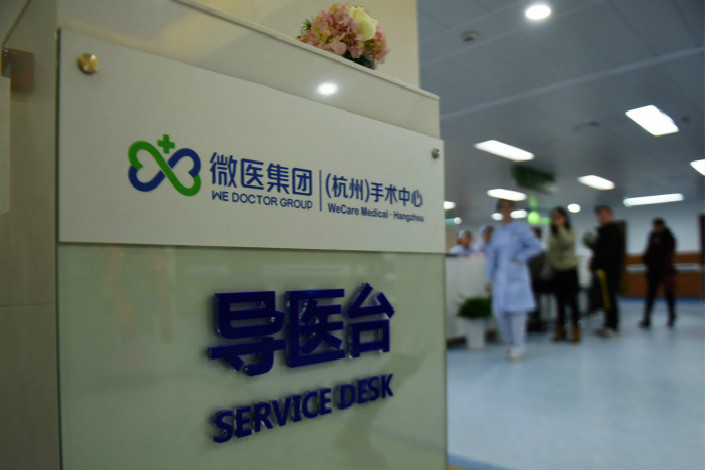Tencent-Backed WeDoctor Aims for Hong Kong, Mainland Listings

Tencent-backed online health care startup WeDoctor is eying initial public offerings (IPOs) both on the Chinese mainland and in Hong Kong for several of its businesses, sources at the company told Caixin.
WeDoctor, which has recently completed a $500-million pre-listing funding round that valued it at $5.5 billion, will seek to list a unit in Hong Kong that covers its health care, medicine and insurance businesses before the end of the year, the source said.
It will also seek a mainland IPO for a subsidiary that offers cloud computing and big data services to hospitals and government agencies. Due to policy restrictions, Chinese firms that handle health care data are not allowed to list on stock markets outside the mainland.
The company had previously considered the New York-based Nasdaq Stock Market, the person said, but abandoned the plan due to the policy restrictions as well as the fact that U.S. investors are less familiar with Chinese companies.
The decision has come at a time when Chinese regulators are loosening the rules to encourage firms from the high-tech and emerging strategic sectors to raise funds on the domestic stock market, while the Hong Kong Stock Exchange has opened its door to more biotech firms.
WeDoctor, based in Hangzhou, Zhejiang province, started as a website for patients to make online appointments with doctors. It later evolved into a larger platform for people to consult doctors online, buy medicine and health insurance.
It has secured at least $1 billion from investors that included Tencent Holdings Ltd., Fosun and a China Development Bank subsidiary. Tencent is now its second-largest shareholder.
WeDoctor is not the only player in this emerging industry. The online health care unit of Ping An Insurance Group, China’s second-largest life insurer by premium income, listed in Hong Kong two weeks ago. But it share price has mostly languished below the IPO price of HK$54.8 ($6.98).
China’s health care market is huge, given the rising income of its large population, but it is also highly policy driven. The State Council, China’s cabinet, issued a guideline last month to support internet-based health care services, but also implemented fresh restrictions. For example, patients will not be able to connect with doctors online if it is their first consultation, but online hospitals can help with subsequent visits.
Contact reporter Coco Feng (renkefeng@caixin.com)

- 1Cover Story: China Carves Out a Narrow Path for Offshore Asset Tokenization
- 2Drownings Shake Chinese Enthusiasm for Travel to Russia
- 3Over Half of China’s Provinces Cut Revenue Targets
- 4Li Ka-Shing’s Port Empire Hit by Forced Takeover Amid Panama Legal Dispute
- 5In Depth: China’s Mutual Fund Industry Faces Overhaul After a Banner 2025
- 1Power To The People: Pintec Serves A Booming Consumer Class
- 2Largest hotel group in Europe accepts UnionPay
- 3UnionPay mobile QuickPass debuts in Hong Kong
- 4UnionPay International launches premium catering privilege U Dining Collection
- 5UnionPay International’s U Plan has covered over 1600 stores overseas






